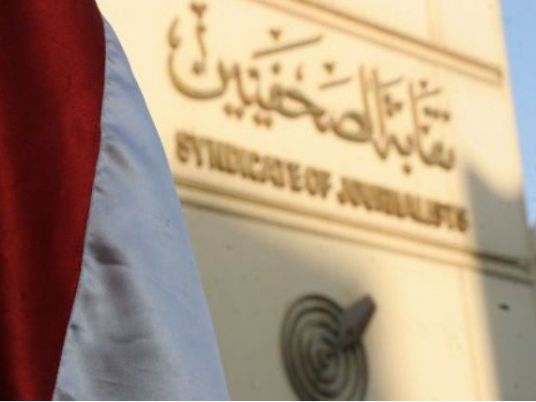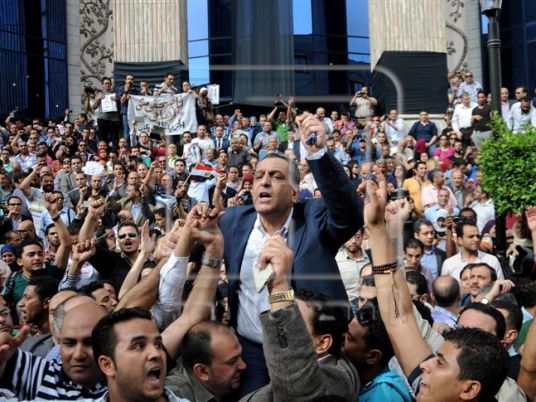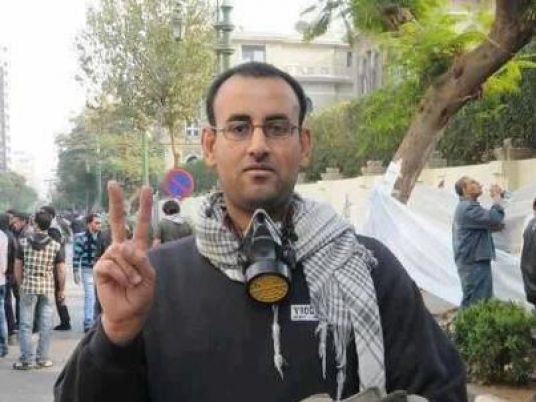A pundit known for opposing the transfer of power from President Hosni Mubarak to his son, Gamal, managed Sunday to force a run-off vote in elections for head of the Egyptian Journalists Syndicate after coming in a close second behind government-backed incumbent Makram Mohamed Ahmed.
Following the vote, Mohamed el-Sayed, head of the judicial committee mandated with overseeing elections, announced that independent candidate Diaa Rashwan had received 1458 votes to Ahmed’s 1497, necessitating a second round of elections scheduled for 13 December. According to syndicate bylaws, candidates must garner more than 50 percent of the vote–which neither did–in order to secure the post.
Five other candidates, meanwhile, received only 44 votes between them. Of a total of 5532 journalists registered to vote in the election, which is held every two years, roughly 3000 cast ballots this time around.
After results were announced, Rashwan was joyfully hoisted on the shoulders of enthusiastic supporters, who hailed him as a symbol of "youth and change."
“This is a victory for all those who stand for change and independence,” Rashwan told cheering supporters. “I expect more pro-change journalists to cast their ballots in the second round.”
Rashwan, 49, an expert on political Islam at the semi-official Al-Ahram Center for Political and Strategic Studies, has been a vocal opponent of the notion of father-to-son presidential succession–a widely anticipated scenario in Egypt.
The Nasserist-leaning writer is also known for criticizing the small circle of businessmen associated with presidential scion Gamal Mubarak. The younger Mubarak currently serves as deputy secretary-general of the ruling National Democratic Party, while also heading up the party’s highly influential Policies Secretariat.
Rashwan’s campaign included promises to secure the syndicate’s financial independence, raise journalists’ monthly wages and abolish a law allowing for the imprisonment of journalists found guilty of certain "publishing offences."
Unlike other syndicate heads within the last three decades, Rashwan has never been elected to the syndicate’s board. His strong performance, therefore, was largely viewed as a protest vote against Ahmed, who has held the post of syndicate president three times in the past (1989-1993; 1997-1999; and 2007-2009).
“Everyone says Ahmed is a professional and respected journalist, but I don’t really know him," said Mahmoud Bassiouny, a 29-year-old reporter for independent daily Nahdet Masr. "It’s time to get rid of all these old guys.”
Ahmed, 75, was first elected to the syndicate board in 1968. Since then, he has held several senior positions at leading official publications, such as flagship government daily Al-Ahram and weekly magazine Al-Mussawer, serving as editor-in-chief of the latter for more than 20 years.
Opposition to Ahmed’s re-election is also closely bound up with his politics.
“Ahmed represents the iron fist of the government,” said Khaled el-Balshy, former editor-in-chief of independent daily Al Badeel, which suspended its activities last year for financial reasons. “After his success in preventing dissidents from using syndicate premises, he would certainly forbid demonstrations at the syndicate’s headquarters."
Before his last election to the post in 2007, Ahmed had pledged to “liberate” the black-marbled stairs of the syndicate’s headquarters–a time-honored venue for political protest–in downtown Cairo. Often cordoned off by a stifling security presence, the building represents a rare safe haven from Egypt’s 28-year-old Emergency Law, which grants the state sweeping powers of arrest.
Last month, a group of prominent opposition figures calling for free parliamentary and presidential elections–scheduled for 2010 and 2011 respectively–was barred from entering syndicate premises.
The razor-thin vote margin between incumbent and challenger may also be attributed to the government’s growing incapacity to mobilize support for its respective nominees.
“In 2003, when we voted against the pro-government candidate, the Al-Ahram management was able to penalize us financially," said Sayyed Mahmoud, culture editor at official daily Al-Ahram Al-Masaei. "But now this is practically impossible.”
“With the launch of numerous private newspapers and television stations within the last five years, journalists have been able to achieve greater financial security vis-à-vis the state,” Mahmoud added.
This year’s Journalists Syndicate elections were also the first to be held on an individual basis, as opposed to previous races in which electoral lists were based on affiliation to certain newspapers–a system that made it easier for chief editors of state-run papers to marginalize dissenters.
Nevertheless, the outcome of the upcoming second voting round remains difficult to predict. Members of Rashwan’s camp, for their part, fear machinations by the state aimed at weakening their nominee.
“We’re concerned that Ahmed might have a last minute surprise,” one avid Rashwan supporter told Al-Masry Al-Youm on condition of anonymity. “He might manage to convince the government to offer more money to journalists in the form of allowances, for example, or low-priced apartments.”
After meeting with Prime Minister Ahmed Nazif late last month, Ahmed announced that the government would raise a monthly LE530 "training allowance"–to which all registered journalists are entitled–by an extra LE80, in a move seen by many independent observers as a surreptitious means of vote buying.




